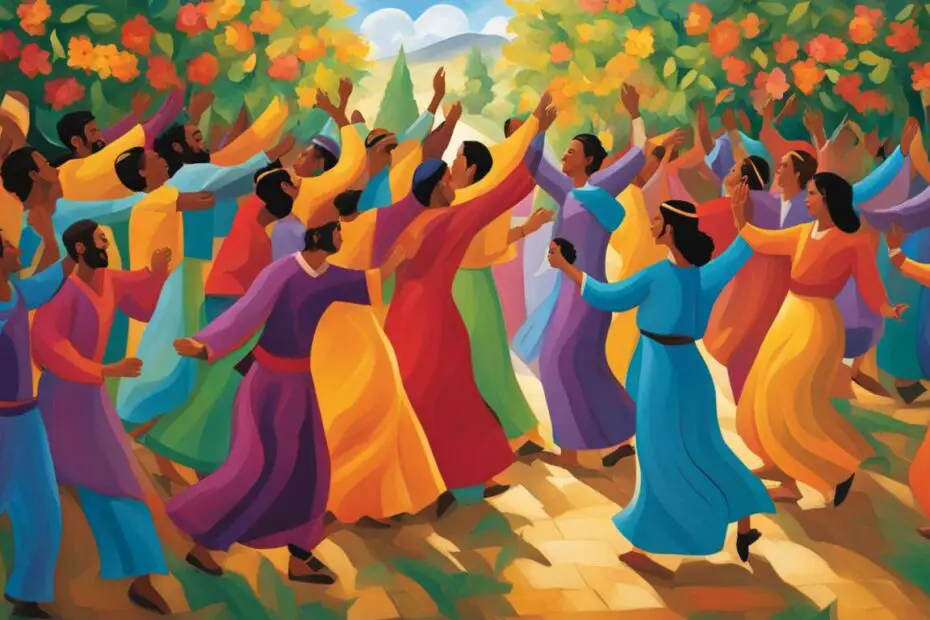The concept of worship has become foreign to contemporary society, which is saturated with self-worship and material aims. This article aims to explore the profound worship Hebrew meaning and its significance in our lives.
Key Takeaways:
- Understanding the worship Hebrew meaning is crucial in today’s self-centered culture.
- Hebrew worship involves reverence, humility, and service.
- Worship in Hebrew culture encompasses acts of sacrifice and extending blessings.
- By exploring the Hebrew meaning of worship, we can enrich our spiritual journey.
The Importance of Worship in Hebrew Culture and Ancient Times
In Hebrew culture and ancient times, worship held immense significance. The Hebrew word for worship, “shâchâh,” encompasses the act of lowering or prostrating oneself, symbolizing humble reverence before the divine. It played a vital role in the religious practices of the Hebrews, signifying their alignment with the Good and the Source of all Good. Through worship, the Hebrews sought to connect with the divine presence and express their gratitude and devotion.
Worship in Hebrew culture went beyond mere rituals and ceremonies; it encompassed a deep spiritual connection with the divine. It was an active response to the divine presence, involving the transformation of the mind, renewing the heart, and surrendering one’s actions in obedience and service. The Hebrews understood that worship was not limited to a specific location or time; it was a way of life, guiding their thoughts, words, and deeds.
“True worship is the expression of the innermost self, the pouring out of gratitude, love, and awe towards the divine. It is a humble surrender to the Source of all existence and a recognition of our dependence on the divine for guidance and sustenance.”
Through worship, the Hebrews sought to establish a deep connection with the divine, recognizing the divine as the Source and Ground of all worth. It was a way of acknowledging the infinite worthiness of the divine and giving glory to the One who created and sustains all things.
The Significance of Worship in Hebrew Culture
| Aspect of Worship | Explanation |
|---|---|
| Reverence | Worship in Hebrew culture involved showing deep respect and awe towards the divine, recognizing its holiness and power. |
| Humility | Worshipers would lower themselves before the divine, acknowledging their own limitations and the greatness of the divine. |
| Service | Worship was not just about rituals; it included acts of service and obedience to the divine, manifesting love and devotion in everyday life. |
| Sacrifice | Physical offerings and the sacrifice of personal desires and ego were integral to worship, demonstrating dedication and commitment to the divine. |
By understanding the importance of worship in Hebrew culture and ancient times, we can gain a deeper appreciation for its transformative power and the potential it holds for our own spiritual growth and connection with the divine.
The Meaning of Worship in the Hebrew Tanach
In the Hebrew Tanach, the word used to refer to worship is “shâchâh,” which signifies bowing down or prostrating oneself. This physical act represents an active response to the Divine, involving the transformation of the mind, renewing the heart, and surrendering one’s actions in obedience and service. Worship in the Hebrew context goes beyond mere words or rituals; it encompasses a deep connection with the divine and a profound commitment to living in alignment with its will.
In Hebrew, worship is not just a passive expression of belief, but a transformative practice that requires one’s entire being. It is not confined to the walls of a religious institution but permeates every aspect of life. Worship is a continuous conversation with the divine, a way of living that shapes character, values, and actions. It is through worship that individuals find their true identity and purpose, and experience a profound connection with the Source of all existence.
The Hebrew definition of worship emphasizes the acknowledgement of the infinite worthiness of the Divine. It involves recognizing that the Source and Ground of all worth resides outside of oneself, transcending ego and personal desires. Worship is an act of surrender and submission, a declaration that the Divine holds ultimate authority and wisdom. It is a humble recognition of our own limitations and a willingness to align our lives with a greater purpose.

The Hebrew Tanach and the Definition of Worship
| Hebrew Word | Translation |
|---|---|
| שָׁחָה (shâchâh) | To bow down, prostrate oneself |
| עָבַד (‘âbhad) | To serve, worship |
| קָרַב (qârab) | To draw near, approach |
| בָּרַךְ (bârakh) | To bless, kneel |
“Worship in Hebrew is not just about what we do in religious services; it is about how we live our lives. It is about aligning our values, actions, and intentions with the divine will. Worship is the practice of surrender and the act of extending blessings to others.”
Throughout the Hebrew Tanach, these words are used to describe the multifaceted nature of worship. They emphasize that worship is not a one-time event or a superficial gesture, but a lifelong commitment to live in harmony with the divine purpose. It is a transformative journey that leads to spiritual growth and a deepening of one’s relationship with the Divine.
The Glorious and Humble Aspects of Worship in Hebrew Scripture
In Hebrew Scripture, the concept of worship is portrayed as a magnificent interplay between glory and humility. Worship involves giving glory to the Divine and recognizing its infinite worthiness. As worshippers, we acknowledge the greatness of the Source of all Good and offer our reverence and awe. This act of exalting the Divine brings us closer to the divine presence and helps us align our hearts and minds with the divine purpose.
“Give unto the Lord the glory due unto his name; worship the Lord in the beauty of holiness.” (Psalms 29:2)
At the same time, Hebrew Scripture emphasizes the importance of humility in worship. By lowering ourselves before the Divine, we acknowledge our own limitations and surrender our egos. In this act of humility, we open ourselves to the transformative power of worship and allow the divine essence to flow through us. Humility in worship is not a sign of weakness, but rather a recognition of the greatness of the Divine and our place in the grand tapestry of creation.
It is through the delicate balance of glory and humility that worship nourishes our souls and enriches our lives. The glory we give to the Divine uplifts us and reminds us of our connection to something greater than ourselves. The humility we cultivate in worship humbles us and allows us to become vessels of divine love, compassion, and wisdom.
The Power of Glorious and Humble Worship
The duality of glory and humility in worship holds profound significance for individuals, communities, and societies. When we engage in glorious worship, we tap into the divine energy that resides within us and around us. Through acts of praise, adoration, and thanksgiving, we cultivate gratitude, joy, and a sense of purpose. Glorious worship inspires us to live in alignment with the divine virtues and values, guiding our actions and choices towards goodness and righteousness.
Simultaneously, embracing humility in worship opens our hearts to compassion and empathy. It reminds us of our interconnectedness with all beings and compels us to act with kindness, integrity, and humility in our interactions with others. Humble worship teaches us the invaluable lesson of surrendering our ego and placing the needs of others above our own. It encourages us to serve and uplift our fellow human beings, contributing to the wellbeing and flourishing of society as a whole.
As we embark on the journey of worship in the Hebrew tradition, we are invited to embrace both the glorious and humble aspects of this sacred practice. By bestowing glory upon the Divine and cultivating humility within ourselves, we tap into the transformative power of worship. This power has the potential to elevate our lives, enrich our relationships, and bring about positive change in the world.
Worship as Service and Sacrifice in Hebrew Worship Practices
Worship in the Hebrew language encompasses the notions of service and sacrifice. It is a profound act of honoring and serving the divine, involving various rituals and offerings. In Hebrew culture, worship is not merely a passive expression of devotion but an active engagement that requires selfless dedication and commitment.
In biblical rituals of worship in Hebrew, sacrificial offerings played a central role. These offerings, including animal sacrifices, grain offerings, and libations, symbolized the worshipper’s willingness to surrender their prized possessions and desires to the divine. The act of sacrifice was seen as a way to demonstrate devotion, seek forgiveness, and establish a deeper connection with the divine.
Moreover, worship in the Hebrew context also encompasses the idea of service. It is not limited to the offerings made at the altar but extends to acts of kindness, justice, and compassion towards others. True worship involves selflessly serving the needs of others and striving for social justice and equality in the community.
The Ritual of Sacrifice
| Sacrifice | Description | Purpose |
|---|---|---|
| Burnt Offering | An animal sacrifice completely consumed by fire on the altar. | To express gratitude and seek atonement for sins. |
| Grain Offering | A portion of grain or bread offered to the divine. | To acknowledge the divine provisions and thanksgiving. |
| Peace Offering | An offering shared as a communal meal between worshipper and divine. | To celebrate and express joy, gratitude, and fellowship with the divine. |
By engaging in acts of worship as service and sacrifice, individuals not only demonstrate reverence and devotion but also cultivate a sense of humility, selflessness, and gratitude. Worship in the Hebrew language goes beyond rituals; it is a way of living that seeks to align oneself with the divine purpose and bring blessings to others.

Worship and the Hebrew Concept of Blessing
The Hebrew concept of worship goes beyond the mere act of reverence and adoration. It encompasses the idea of extending blessings to others, thereby embodying a life of gratitude and service. Worship in Hebrew is not confined to a specific place or time; it is a way of living that seeks to benefit others and honor the divine.
“True worship is not defined by rituals or religious practices alone; it is a heartfelt expression of gratitude and reverence that spills over into actions of love and kindness towards others.”
Through worship, one acknowledges the goodness and blessings received from the divine and seeks to share them with others. It is a transformative experience that changes not only the individual but also the community and society at large.
The Connection between Worship and Blessing
In Hebrew culture, worship is intimately tied to the concept of blessing. The act of worship involves recognizing and affirming the goodness in one’s life and then extending those blessings to others.
When we worship in the Hebrew sense, we acknowledge that we are not the sole recipients of blessings; rather, we are conduits through which blessings flow to others. It is through acts of kindness, compassion, and generosity that we fulfill the true essence of worship.
As we worship by extending blessings, we create a ripple effect of positivity and goodness in the world. We become agents of change, spreading love and light wherever we go.
The Impact of Worship as Extending Blessings
When we embrace the Hebrew concept of worship as extending blessings, we not only enrich our own lives but also contribute to the wellbeing of our communities. The act of worship becomes a catalyst for positive change, inspiring others to join in the pursuit of a more compassionate and harmonious world.
Through worship, we cultivate a mindset of abundance and gratitude, recognizing that we have been blessed in order to bless others. It is a continuous cycle of giving and receiving, where acts of worship transform us into vessels of divine love and grace.
By living a life rooted in worship and extending blessings, we align ourselves with the higher purpose of our existence and experience the profound joy and fulfillment that comes from selflessly serving others.
| Blessings of Worship | Impact |
|---|---|
| Increased sense of gratitude | Brings joy and contentment |
| Strengthened relationships | Fosters unity and harmony |
| Positive influence on others | Inspires compassion and generosity |
| Transformation of self | Growth in character and spirituality |
As we journey on the path of worship and extending blessings, we discover that our lives are not simply about personal achievements and pursuits, but about making a positive difference in the lives of others. Worship, when understood in its true essence, becomes a powerful force that shapes us into individuals who bring light and hope to a world in need.
Hebrew Worship and the Call to Bless and Benefit Others
Hebrew worship goes beyond rituals and ceremonies; it encompasses a profound call to bless and benefit others. The Hebrew Scriptures emphasize the importance of extending the goodness and blessings received from the Divine to those around us. This extended meaning of worship in Hebrew reveals a deeper purpose and a way of life that is rooted in compassion and service.
In the biblical narrative, we find examples of individuals who embraced this call to bless and benefit others. Abraham, known as the father of many nations, was not only blessed by God but was also chosen to be a blessing to others. His entire life was dedicated to acts of kindness, generosity, and hospitality towards strangers and those in need.
Through these stories, we learn that worship in Hebrew is not confined to religious acts performed within sacred spaces. It is a way of living that seeks to uplift and bring positive change to the world. The call to bless and benefit others is an integral part of the Hebrew understanding of worship, reminding us of our interconnectedness and the responsibility we have to create a better, more compassionate society.
The Extended Meaning of Worship in Hebrew
The extended meaning of worship in Hebrew can be summarized as a call to live a life that is dedicated to acts of love, kindness, and justice. It is a holistic approach that encompasses every aspect of our existence, from our relationships with others to the way we steward the earth and its resources.
“True worship is not confined to religious rituals; it is a way of life that seeks to bless and benefit others.” – Hebrew Wisdom
This extended meaning of worship challenges us to go beyond the confines of traditional religious practices and engage in meaningful actions that make a positive difference in the lives of those around us. It invites us to embody the values of compassion, justice, and humility as we seek to honor the Divine and serve humanity.
| Biblical Call to Bless and Benefit Others | |
|---|---|
| 1. | Abraham’s Hospitality and Generosity Abraham’s willingness to open his home and provide hospitality to strangers exemplifies the call to bless and benefit others. His actions demonstrate the importance of extending kindness, love, and care to those in need. |
| 2. | Moses’ Advocacy for Justice Moses, as a leader and prophet, worked tirelessly to advocate for justice and freedom for the Israelites. His life serves as a powerful example of how worship in Hebrew is intertwined with the pursuit of righteousness and the liberation of the oppressed. |
| 3. | Prophets’ Call for Social Justice The Hebrew prophets consistently called for social justice, urging the people to care for the marginalized, the poor, and the oppressed. Their messages inspire us to actively engage in acts of compassion and work towards a more just society. |
This extended meaning of worship in Hebrew reminds us that our spiritual journey is not confined to personal piety but is deeply intertwined with our commitment to love, serve, and uplift others. By living out this call to bless and benefit others, we find fulfillment in our worship and contribute to the creation of a world guided by compassion and justice.
Conclusion
As we have delved into the worship Hebrew meaning, it becomes evident that worship holds a profound significance in Hebrew culture and ancient times. It encompasses reverence, humility, service, sacrifice, and the extension of blessings to others. By understanding the true essence of worship, we can embark on a spiritual journey that enriches our lives.
Worship in Hebrew culture goes beyond mere rituals; it involves a wholehearted surrender to the divine. The act of worship is an active response, transforming our minds, renewing our hearts, and guiding our actions in obedience and service. It is a declaration of the infinite worthiness of the Divine, acknowledging its role as the Source and Ground of all worth.
In Hebrew Scriptures, worship is portrayed through a harmonious blend of glory and humility. By giving glory to the Divine, we acknowledge its greatness and magnificence. Simultaneously, we humble ourselves before the Source of all Good, recognizing our dependence and expressing reverence.
Moreover, worship in Hebrew language encompasses the notions of service and sacrifice. It involves honoring and serving the divine through various rituals and acts of devotion. Sacrifice, both in the form of physical offerings and the sacrifice of our desires and ego, is an integral part of worship. It reminds us to prioritize the higher purpose and align ourselves with the divine will.
FAQ
What is the Hebrew word for worship?
The Hebrew word for worship is “shâchâh,” which means to lower or prostrate oneself before the divine.
What does worship involve in the Hebrew context?
Worship in the Hebrew context involves the transformation of the mind, renewing the heart, and surrendering one’s actions in obedience and service to the divine.
What are the significant aspects of worship in Hebrew Scripture?
Worship in Hebrew Scripture involves giving glory to the divine and recognizing its infinite worthiness, as well as humbling oneself before the Source of all Good in reverence and awe.
How is sacrifice connected to worship in Hebrew culture?
Sacrifice, both in the form of physical offerings and the sacrifice of one’s own desires and ego, is considered an integral part of worship in Hebrew culture.
What does it mean to worship in the Hebrew language?
To worship in the Hebrew language means to extend the good and blessings bestowed upon oneself to others, living a life that seeks to benefit and bless others.
How does worship relate to blessing in Hebrew culture?
Worship in Hebrew culture is closely tied to the concept of blessing, whereby worshippers strive to live in a way that brings blessings and benefits to others.
What is the ultimate goal of worship in Hebrew culture?
The ultimate goal of worship in Hebrew culture is to live in a way that blesses and benefits others, aligning with the divine purpose.








